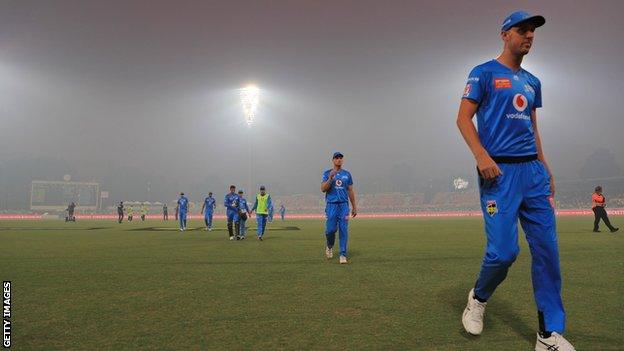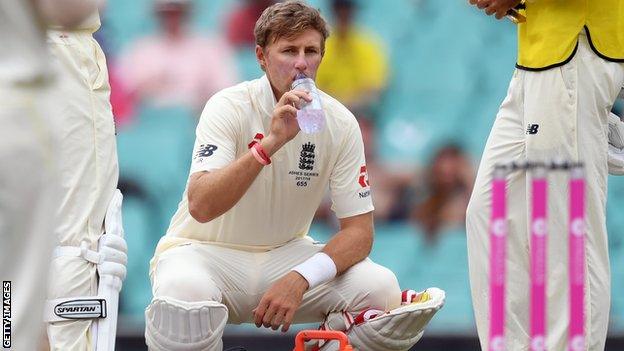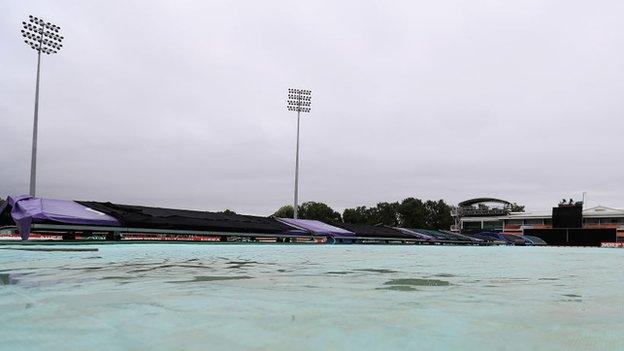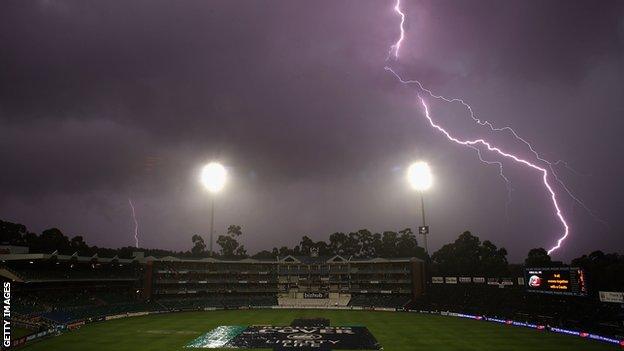Climate change: Cricket's groundkeepers on tackling the sport's climate crisis
- Published

A Big Bash League game between Adelaide Strikers and Sydney Thunder in 2017 was abandoned because of poor air quality caused by smoke from bushfires
Cricket lives and breathes outside, but the game can no longer escape the changing climate snapping at its heels.
Many Test nations lie at particularly climate-vulnerable latitudes - Pakistan, India, Bangladesh, West Indies, Sri Lanka, South Africa - and global temperature rises are having a devastating impact.
The Cape Town drought between 2015-18 led to the temporary cancellation of club and schools cricket. IPL matches have been moved because of lack of water; while in Australia bush fires caused the cancellation of many grassroots and one Big Bash game.
Pollution stopped play in the 2017 Delhi Test between India and Sri Lanka as players vomited on the pitch, while hurricanes Irma and Maria, which caused widespread loss of life as they swept through the Caribbean, also severely damaged five cricket stadiums.
Even in the relatively protected UK, flooding has ruined grassroots clubs and led to huge numbers of abandoned games.
The Game Changer report of 2017, which named cricket the most climate-vulnerable pitch sport, concluded that more than a quarter of England's home one-day internationals since 2000 had been truncated because of rain.
The extremes of heat and air pollution are particularly harmful to athletes exerting themselves and young children playing outside.
At the sharp end are cricket's groundstaff, out in the elements all year, the changing climate their new reality.
BBC Sport spoke to three, in the UK, Australia and South Africa, about how the climate crisis is affecting the way they work and their worries for the future.
Australia - Justin Groves

Joe Root needed hospital treatment for severe dehydration after batting in extreme heat during the Sydney Ashes Test in January 2018
Justin worked as grounds manager for both the Adelaide Oval and Sydney Cricket Ground
"I saw big changes during my 15 years in Adelaide. The climate, though very dry, became more humid and with that you get more fungal disease and attract more pests.
"The seasons are getting longer and later than ever before. By April and May it used to get cool, now we're seeing temperatures in the mid 30s and winter sports are being played in those temperatures.
"We have to work hard to manage the grass, whereas 15 years ago the climate did it for us.
"With more humid and higher temperatures moisture is drawn out of the ground through evapotranspiration. We also have water restrictions which we didn't have 15 years ago.
"We used to pump water out of the River Torrens but, with the lack of rainfall, there is now too much algae in that water.
"At the SCG we had to stop a game in 2019 because of the lack of visibility and air quality. It was quite a bizarre scenario, you could barely see the other side of the Oval, it was eerie as the smoke started drifting across the ground.
"I remember sitting on a roller in the SCG in my suit in the innings break during the Ashes in January 2018. It was my first Test match. It was 55 degrees on the boundary line and in the middle with the black soil which reflects back like a bitumen road, it must have been nearly 60 degrees.
"I was thinking you guys are just stupid to be playing cricket out here! It was the Test when Joe Root had to go to hospital in a dehydrated condition."
United Kingdom - Sean Williams

Sean started as deputy groundsman at Gloucestershire County Cricket Club in 1990 and took over as head groundsman in 2000.
"Have I seen a changing climate? Absolutely, especially over the last four or five years.
"We are increasingly reacting to extremes: hotter weather, more intense rain and for longer periods - just in the past month we've twice had two inches of rain in the day.
"If the rain is too hard, all day, like during the 2019 World Cup games at Bristol, games will be rained off even though the drainage is so much better than it used to be.
"We have more pests because of the weather and restrictions in chemical use. Over the past couple of years we've had problems with daddy long legs, their larvae (leatherjackets) feed on the grass roots in the winter, especially this year when there was no growth because it was cold. We are concerned this is going to be an issue down the line.
"The heat and heavy rain are also perfect conditions for other diseases and keeping sheets on in the heat, to protect the square from rain, encourages fungal disease.
"It is not like the seasons we had before, everything is far more interlinked, the winters feel longer with snow and colder weather into March and April and you don't get the summer we used to through June and July.
"We have been talking to the board about trying to do things better. We are trying to reduce our fertilizer use and have introduced over past three years a biological application to the ground and are applying one summer fertiliser application and topping up with seaweed until one more winter fertiliser feed.
"Some products can only be sourced in South America though which means you are using more air miles - sometimes these things are a difficult call."
South Africa - Evan Flint

Evan has been Head groundsman at the Wanderers in Johannesburg since 2019 and before that Newlands in Cape Town for 11 years.
"In the time I was at Cape Town I noticed a drop in the amount of winter rain which would have a devastating effect in the hot summer months, especially during the 2018 drought.
"On a personal level, I remember 2018 being incredibly scary, we were down to 50 litres a day per person, and on a professional level it was hard. We still had to irrigate the pitch because of the high clay content, but the outfield we let go.
"It was an amazing eye opener for me that you don't need as much water as you think you do. Turf can survive, in fact it is probably healthier, living on the edge. The browner the outfield became the more I knew I was doing my bit.
"At the top level, play is always going to be on natural turf because it provides that variation that makes the game interesting but at lower levels artificial turf is a no brainer in terms of maintenance and savings on water.
"In Johannesburg the rain seems to be coming a bit later, March and April then nothing through to September. This year, it's November and we've only had 68 millilitres in the year.
"At this time of the year I always used to spray a lot, now I look at my little microclimate that I'm in charge of and think there has got to be enough space to coexist. I'm trying to move away from killing pests: so what if there's a couple of cricket (insect) patches.
"I am worried, I've got young children, it does concern me how we're treating the world, and until it's actually in front of you it is easier to pretend it is not a problem. Then you wake up, but it might be a bit late."

The best betting coup in history?: How one man was able to beat the bookies
Can football help save the planet?: Find out how clubs can go eco-friendly
